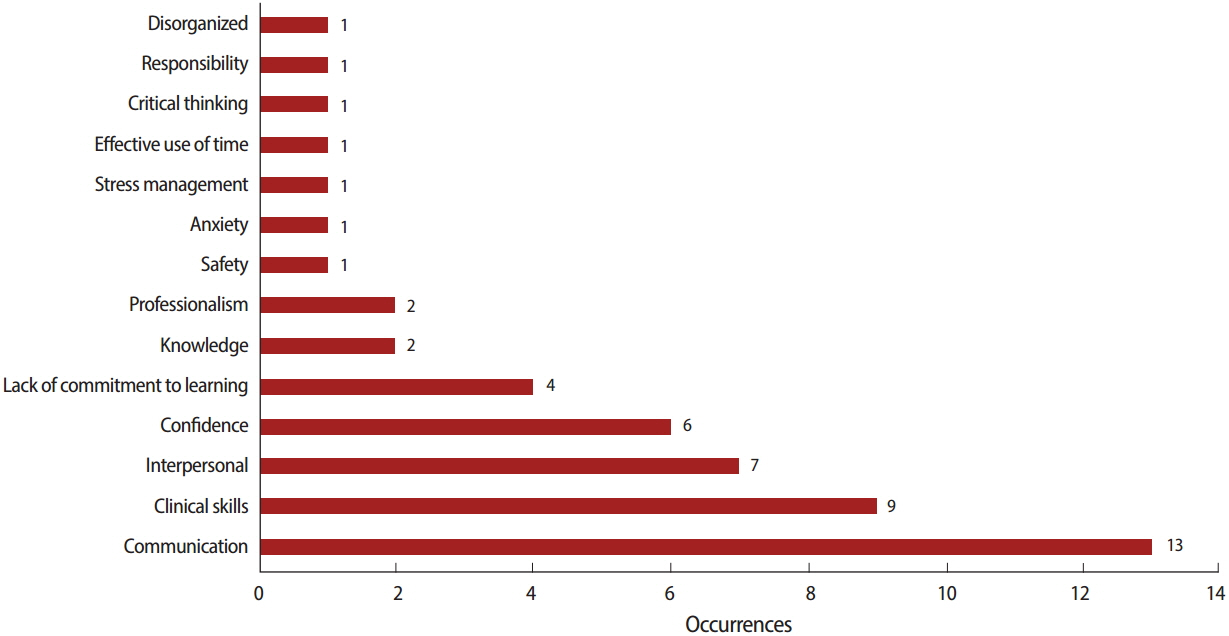J Educ Eval Health Prof.
2016;13:26. 10.3352/jeehp.2016.13.26.
Effectiveness of pre-admission data and letters of recommendation to predict students who will need professional behavior intervention during clinical rotations in the United States
- Affiliations
-
- 1Department of Rehabilitation Sciences, College of Allied Health Sciences, University of Cincinnati, Cincinnati, OH, USA. engelhcr@ucmail.uc.edu
- KMID: 2413775
- DOI: http://doi.org/10.3352/jeehp.2016.13.26
Abstract
- The study aimed at finding the value of letters of recommendation in predicting professional behavior problems in the clinical portion of a Doctor of Physical Therapy program learning cohorts from 2009-2014 in the United States. De-identified records of 137 Doctor of Physical Therapy graduates were examined by the descriptive statistics and comparison analysis. Thirty letters of recommendation were investigated based on grounded theory from 10 student applications with 5 randomly selected students of interest and 5 non-students of interest. Critical thinking, organizational skills, and judgement were statistically significant and quantitative differentiating characteristics. Qualitatively, significant characteristics of the student of interest included effective communication and cultural competency. Meanwhile, those of nonstudents of interest included conflicting personality descriptor, commitment to learning, balance, teamwork skills, potential future success, compatible learning skills, effective leadership skills, and emotional intelligence. Emerged significant characteristics did not consistently match common non-professional behavior issues encountered in clinic. Pre-admission data and letters of recommendation appear of limited value in predicting professional behavior performance in clinic.
MeSH Terms
Figure
Reference
-
References
1. Commission on Accreditation of Physical Therapy Programs. 2014-2015 fact sheet physical therapist education programs [Internet]. Alexandria (VA): Commission on Accreditation in Physical Therapy Education;2015. [cited 2016 Feb 4]. Available from: http://www.capteonline.org/uploadedfiles/capteorg/about_capte/resources/aggregate_program_data/aggregateprogramdata_ptprograms.pdf.2. American Physical Therapy Association. Physical therapy centralized application service 2014-2015 applicant data report [Internet]. Alexandria (VA): American Physical Therapy Association;2015. [cited 2016 Feb 4]. Available from: http://www.ptcas.org/uploadedFiles/PTCASorg/About_PTCAS/PTCASApplicantDataRpt.pdf.3. Jette DU, Bertoni A, Coots R, Johnson H, Mclaughlin C, Weisbach C. Clinical instructors’ perceptions of behaviors that comprise entry-level clinical performance in physical therapist students: a qualitative study. Phys Ther. 2007; 87:833–843. http://dx.doi.org/10.2522/ptj.20070003.
Article4. Utzman RR, Riddle DL, Jewell DV. Use of demographic and quantitative admissions data to predict academic difficulty among professional physical therapist students. Phys Ther. 2007; 87:1164–1180.
Article5. Galleher C, Rundquist P, Barker D, Chang W. Determining cognitive and non-cognitive predictors of success on the National Physical Therapy Examination. Internet J Allied Health Sci Pract. 2012; 10(4):7. http://dx.doi.org/10.2522/ptj.20060221.
Article6. Bathje MS, Ozelie DHS, BCPD R, Deavila MS. The relationship between admission criteria and fieldwork performance in a masters-level OT program: implications for admissions. Open J Occup Ther. 2014; 2:6. http://dx.doi.org/10.15453/2168-6408.1110.
Article7. Nelson LP, Maramaldi P, Kinnunen TH, Kalenderian E. Early performance in a humanistic medicine course as a predictor of dental students’ later clinical performance. J Dent Educ. 2013; 77:1006–1012.
Article8. Lemay JF, Lockyer JM, Collin VT, Brownell AK. Assessment of non-cognitive traits through the admissions multiple mini-interview. Med Educ. 2007; 41:573–9. http://dx.doi.org/10.1111/j.1365-2923.2007.02767.x.
Article9. Strauss A, Corbin J. Grounded theory methodology. In : Denzin NK, Lincoln YS, editors. The Sage handbook of qualitative research. 4th ed. Newbury Park (CA): Sage Publications;1994. p. 273–285.10. Lazarus A. Soften up: the importance of soft skills for job success. Physician Exec. 2013; 39.5:40–45.
- Full Text Links
- Actions
-
Cited
- CITED
-
- Close
- Share
- Similar articles
-
- Impact of individualized learning plans on United States senior medical students advanced clinical rotations
- Are we teaching health science students in the United States what they need to know about death and dying coping strategies?
- Analysis of characteristics shown in self introduction letter and professor's recommendation letter
- Pre-clinical versus clinical medical students' attitudes towards the poor in the United States
- Correlation of Admission Criteria at the Ewha School of Medicine in 2007 with Medical School Performance


